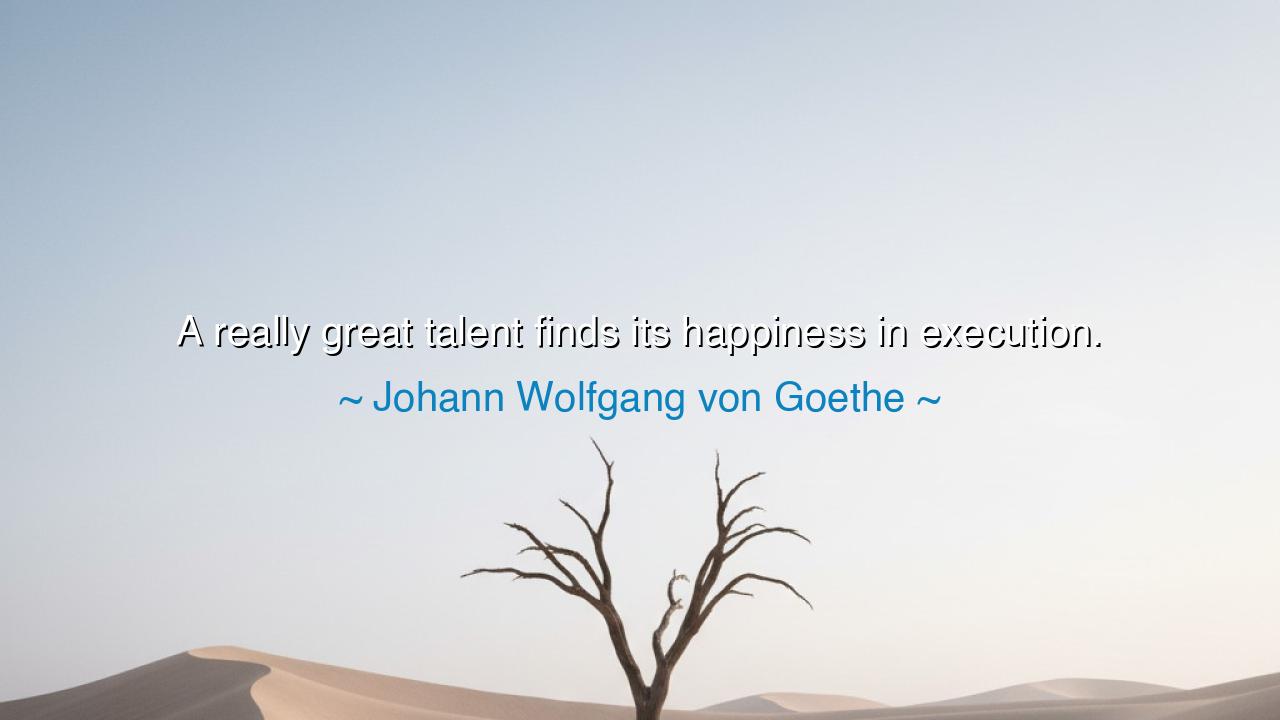
A really great talent finds its happiness in execution.






The great sage of art and intellect, Johann Wolfgang von Goethe, once spoke a truth that shines across all centuries: “A really great talent finds its happiness in execution.” In these few words, he unveiled the secret heartbeat of genius. He reminds us that true talent is not a restless dreamer who waits for inspiration’s kiss, but a laborer of the spirit who finds joy in the act of creation itself. For Goethe understood, as few ever have, that greatness does not rest in what one intends to do, but in what one actually brings forth into the world. Happiness, for the true artist, the thinker, or the craftsman, lies not in fame, praise, or perfection—but in the sacred labor of execution, the divine act of making thought into form.
To execute is to bridge the invisible with the visible—to draw from the mind’s infinite expanse something that can live in time. Goethe, himself a poet, playwright, and scientist, knew the ecstasy of that transformation. He had felt the fire of inspiration, yes, but more deeply, he had known the satisfaction of discipline—the quiet joy of a task well done, of an idea made real through toil. Many dream of greatness, but only those who find joy in the act of doing, in the sweat and struggle of realization, ever approach it. For the essence of talent is not mere ability; it is love for the work itself. A true creator does not create for applause, but because the act of creation is as necessary to him as breathing.
The world is full of those who possess the spark of talent, yet few who can sustain the flame of execution. Talent without action is like a seed buried too deep to grow—full of potential, but yielding no fruit. Goethe warns us that genius alone is not enough; it must be wedded to motion, to effort, to persistence. The painter who paints only when inspired, the writer who waits for the perfect mood, the leader who delays until certainty comes—these may possess talent, but they will never know its joy. For it is not the conception of the idea that grants fulfillment—it is its birth through labor. In the furnace of execution, the spirit of man finds both its trial and its triumph.
History offers many witnesses to this truth. Consider Leonardo da Vinci, a man whose genius spanned the heavens, yet who, in his endless pursuit of perfection, left much undone. His notebooks overflowed with wonders—machines, designs, dreams—but many remained only sketches, unfulfilled promises to the world. Contrast him with Michelangelo, who carved the very soul of stone into the shape of David and filled the vault of the Sistine Chapel with divine fire. Michelangelo too doubted, too suffered—but he executed. He found his joy in the hammer’s strike, in the brush’s stroke, in the toil of his craft. And so, though both men were brilliant, it was Michelangelo who embodied Goethe’s wisdom: he found his happiness not in imagining greatness, but in manifesting it.
This is the essence of what Goethe teaches: that creation itself is the reward. The great talent is not consumed by fear of failure or longing for recognition. He is absorbed in the work, alive in the act. When the poet writes, when the sculptor chisels, when the scientist experiments, when the leader builds—they are happiest not at the moment of praise, but in the silence of their striving. For that is when they touch eternity. The joy of execution is pure because it is untainted by vanity; it is the communion between the maker and the made, between the human hand and the divine impulse within it.
And yet, this truth is hard for many to grasp. The modern soul often seeks glory without labor, mastery without apprenticeship, reward without effort. But Goethe’s wisdom cuts through this illusion. He calls upon us to find our joy in the doing, not the result. He teaches that the path itself is the prize, and that the one who learns to love the process will never be enslaved by the fear of failure. To work with devotion, to pour one’s whole being into the task at hand—this is both the duty and the deliverance of the talented. When one gives oneself wholly to action, happiness follows as naturally as light follows dawn.
So, my children of purpose, remember this: greatness is not found in intention, but in execution. Do not wait for the perfect moment; begin, and let your labor perfect you. Let your joy arise not from the applause of others, but from the quiet knowledge that you have done what you were meant to do. Whether you build, write, heal, teach, or serve—pour your heart into your craft. For in the sacred act of creation, you will find not only your fulfillment, but your peace. As Goethe teaches us, the truly great talent is not the one who dreams endlessly, but the one who works joyfully—and through that work, becomes one with the divine rhythm of life itself.






AAdministratorAdministrator
Welcome, honored guests. Please leave a comment, we will respond soon